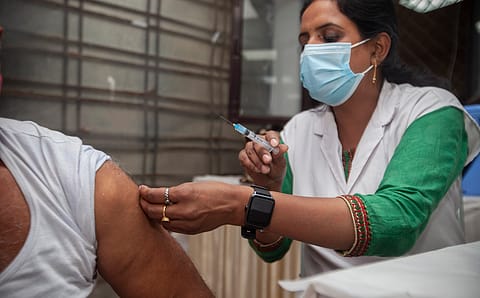India readying 'precaution doses’ to fight Covid-19
Vaccine availability will not be an issue though India requires about 50 crore additional doses for the two categories cleared for booster doses.

While majority of people in low income countries are yet to get a dose of Covid-19 vaccines, India is gearing up to rollout booster doses as 'precaution doses' in the backdrop of the fast-spreading Omicorn variant.
In his address to the nation on Saturday, prime minister Narendra Modi announced to inoculate frontline workers and senior citizens having comorbidities with 'precaution doses' from January 10, 2022, and to start vaccinating children between 15 and 18 years from January 3, 2022. The boosters will be given after nine months of full vaccination.
India had three crore frontline healthcare workers and 13.8 crore elderly people in 2021, comprising 6.7 crore males and 7.1 crore females, according to the report of the technical group on population projections for India. The country has administered nearly 142 crore doses of Covid-19 vaccines in 11 months and has fully vaccinated 41% of its population and another 19% are partially vaccinated. Of them, 1.83 crore frontline workers have taken the first dose and another 1.68 crore took the second dose. Out of nearly 14 crore elders, about six crore are estimated to have co-morbidities. While 12 crore elders have taken the first dose, over nine crore have taken both the doses. Registration options are expected to be updated on the CoWin portal by January 1, 2022.
Sources say vaccine availability will not be an issue though India requires about 50 crore additional doses for these two categories. Minister of state for health Bharati Pravin Pawar told Rajya Sabha two weeks ago that Serum Institute of India is making approximately 25-27 crore doses per month of Covishield and Bharat Biotech is giving 5-6 crore doses of Covaxin. Both companies have achieved close to 90% of their present production capacity. Zydus Cadila, which has got approval, has a stock of about one crore doses and Biological E is stockpiling about 10 crore doses of its vaccine, which is in the final stages of approval. The subject experts committee (SEC) of the Drug Controller General of India (DCGI) is meeting today to decide on emergency use approval (EUA) for Biological E's Corbevax and Serum's new vaccine Covovax. Already nearly 20 crore vaccine doses are pending with various states.
Globally, about 20% of Covid-19 vaccine doses daily are used for booster or additional dose vaccination out of 32.91 million doses being administered each day, says the World Health Organisation (WHO). While 57.4% of the world population has received at least one dose of a COVID-19 vaccine, only 8.3% of people in low-income countries have received at least one dose. At least 126 high-income, or upper middle-income countries have already issued recommendations on booster or additional vaccination and more than 120 have started programmatic implementation, says WHO.
The global health agency's director-general Tedros Adhanom Ghebreyesus had called for a moratorium on booster vaccination for healthy adults until the end of 2021 to counter inequity in global vaccine access as many countries are far from reaching the 40% coverage target by the end of 2021.
Waning of vaccine effectiveness and ability of the virus to overcome jabs with variants like Omicron are forcing the countries to start booster doses. Various studies across the globe has shown vaccine effectiveness against severe Covid-19 decreased by about 8% over a period of 6 months in all age groups. In adults above 50 years, vaccine effectiveness against severe disease decreased by about 10% and against symptomatic disease decreased by 32% for those above 50 years of age.
Recommended Stories
WHO says the global supply is increasing significantly and is projected to be sufficient for vaccination of the entire adult population globally, and boosters of high risk populations by the first quarter of 2022. However, projections show that only later in 2022 supply will be sufficient for extensive use of boosters in all adults, and beyond, should they be broadly needed. "Even as supply has continued to ramp up, hurdles in access and distribution have led to the prevailing inequities that can only be resolved by high coverage and supply and through countries’ commitment to global vaccine goals and targets, and to assisting other countries in need", says WHO. It now recommends the decision to implement a booster dose is complex and requires, beyond clinical and epidemiological data, a consideration of national strategic and programmatic priorities, and importantly an assessment of the prioritization of globally limited vaccine supply. Priority should be given to the prevention of severe disease and sustaining health systems, it says.